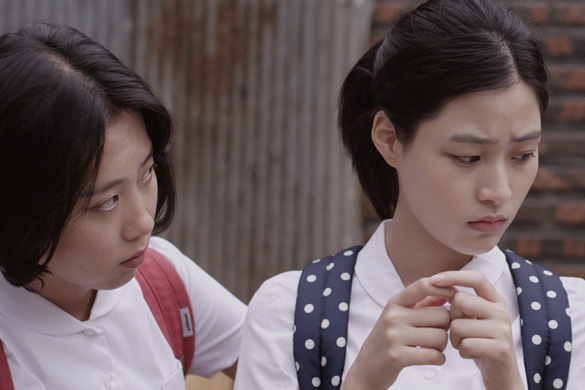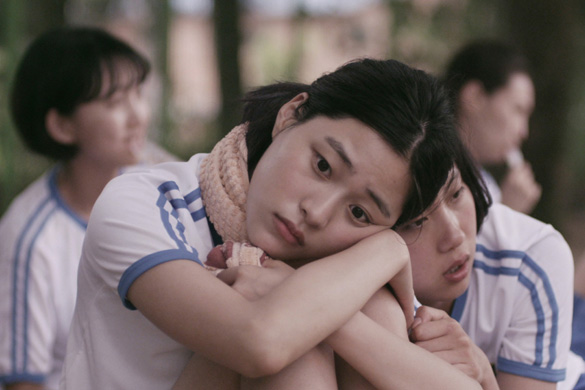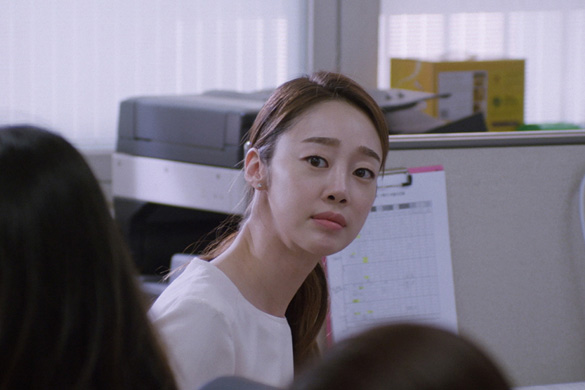
 |
||||
Yongsoon (Lee Soo-kyung) is a schoolgirl in her mid-teens who lives alone with her father, her mother having taken off with her ex-lover when Yongsoon was a small child and having died shortly thereafter. The teenager’s relationship with her dad is antagonistic, to say the least, so when her friend Moon-hee (Jang Haet-sal) suggests joining the school running team Yongsoon jumps at the chance, knowing that with practices taking place straight after school she’ll have an extra excuse to stay away from home as much as is humanly possible.
Review: We are first introduced to Yongsoon in a flashback to the final day she, as a young girl, spent with her mother: At a beach, Yongsoon has lost a pebble in the water – one that her mother drew her daughter’s face on – and as the two search for it her mother hands her a blank pebble saying it’s the lost stone and that the water has washed the painting off, a claim that Yongsoon (in a narration of her thoughts) simply doesn’t believe. In a subsequent scene at her mother’s funeral, Yongsoon is told by her mother’s lover that she missed her very much after she left to start a new life and once again Yongsoon voices her clear disbelief at the assertion, stating frankly “I’m not so sure about that!” Back in the present day, Yongsoon vehemently rallies against any perceived injustices – obviously only those affecting her – at almost the drop of a hat, whether it be her father’s (whom she clearly blames for her mother’s departure years earlier) refusal to buy her new running shoes resulting in her storming off into her locked bedroom, slamming the door almost off its hinges; her anger at her father’s many journeys abroad for work, which she is sure is just an excuse to cover his attempts to get laid by Southeast Asian women; her seethingly using the sticky side of duct tape to try and find hairs from the running coach’s other lover in his car, viciously kicking off his vehicle’s side mirror and storming off into the night when he doesn’t give her the reaction she wants; or indeed her vocalised hatred for the woman her father is trying to start a relationship with. While some of Yongsoon’s perceptions aren’t entirely off the mark, one can’t help feel that her reactions are as often as not self-fulfilling prophecies, the resulting consequences of her choices proving (though only in her mind) that she was right all along and (again from her perspective) warranting further payback in an ongoing vicious cycle. The film’s overarching statement is that Yongsoon’s life can only get better if she actually lets it, but our scarred heroine has far too many altercations still to undertake before that could ever even come close to happening, a fact that sadly Yongsoon herself is utterly unaware of... and so her fight continues, to her own detriment as much as anyone else’s.
The quieter, more poignant moments of Yongsoon (the film) are, to a degree at least, somewhat reminiscent of the work of director Lee Yoon-ki (This Charming Girl, My Dear Enemy, One Day, etc.), in the way that Shin Joon’s direction combines with Lee Soo-kyung’s deft performance to enable viewers to pretty much know the thoughts and feelings going through the titular character’s head just by watching her nuanced facial expressions and looking in her eyes, even when she, head bowed, says not a word. Certainly, the two have created a persona for Yongsoon’s character that feels fully fledged and utterly real (as does each and every one of her relationships whether friendly, antagonistic or indeed a combination of the two) to the extent that those who have dealt with sometimes sullen, often surly adolescents in their own lives will almost feel they’ve actually met Yongsoon before.
Director Shin Joon does introduce moments of genuine humour into proceedings, mainly through Yongsoon’s friends, Moon-hee and Bbak-gyu. These do (briefly) lighten the load somewhat but let’s not forget this is a story of a young girl’s angst and increasing desperation and, as such, that (rightly so) is the feeling that pervades throughout. While this obviously enables her to meet and get close to the coach – creating the basis for the entire subsequent story – it too speaks greatly of this young woman’s psyche. Yongsoon is by far the best of the runners and at one point during a romantic encounter when the coach points out her talent she simply replies “That’s the first time anyone has said I’m good at anything”. Her subsequent efforts on the track – often to the point of absolute exhaustion, wringing in sweat – can almost be seen as the (wholly positive) antithesis of the efforts she makes in her private life, parallel but opposite arcs separated by how Yongsoon feels she is perceived – one driven by support (at least initially), the other driven by feelings of always ultimately being abandoned, ever since her childhood.
YONGSOON (용순) / 2017 / Directed by Shin Joon
|
||||
All images © Lotte Entertainment Review © Paul Quinn |
||||



